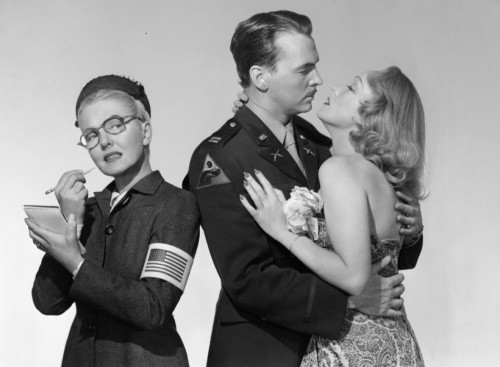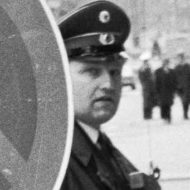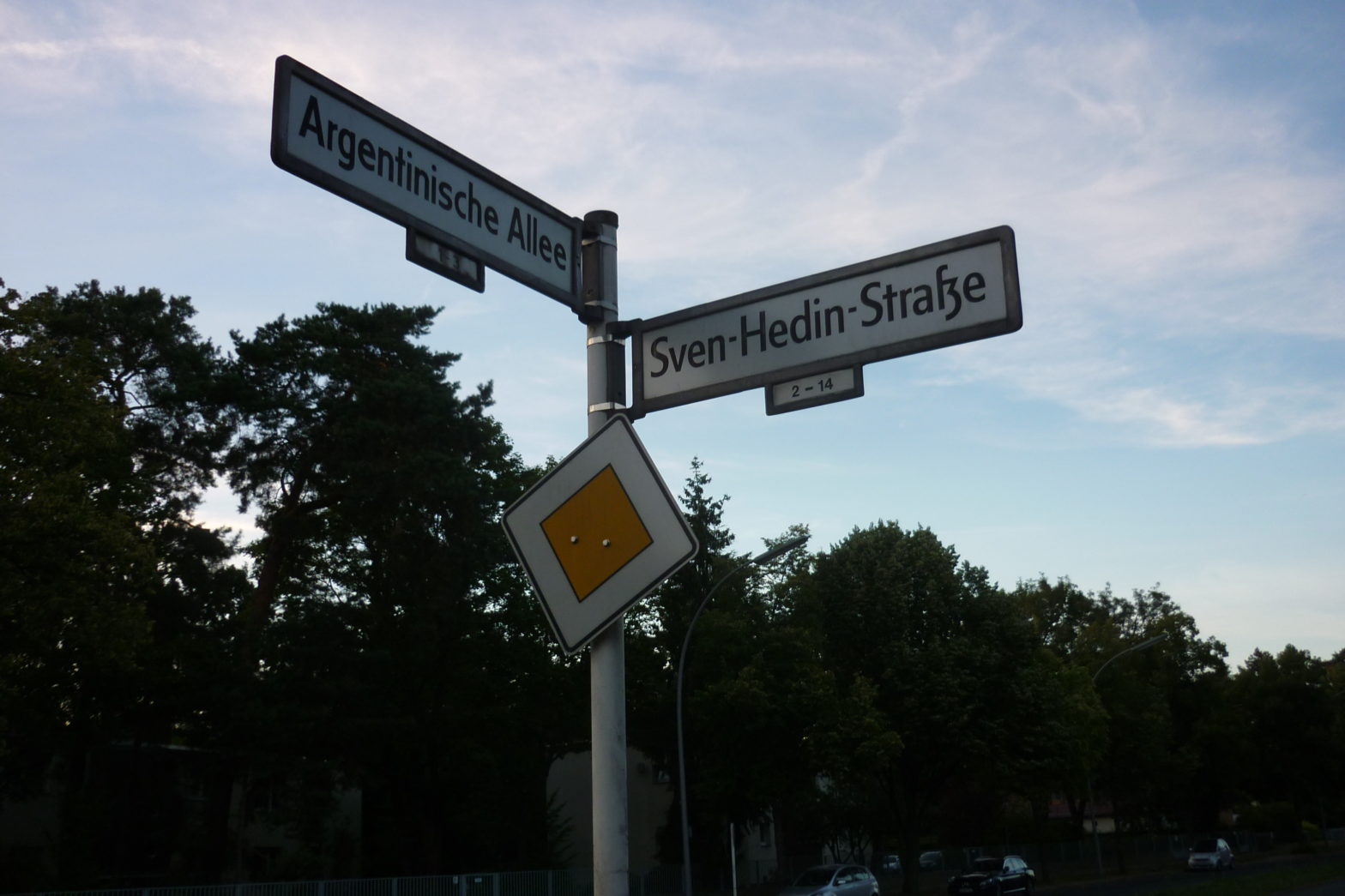In its brief existence the Press Club of Berlin entered American literature. Established novelist John Dos Passos roamed the ruins. Journalists with recognizable bylines published books with their observations.
Leon Uris, best known as the author of Exodus (the novelized founding of the modern state of Israel), applied his talent for deep historical work to postwar Berlin. His 1963 novel Armageddon spans the time from January 1944 through the end of the Blockade. Along the way his thinly disguised real-world characters dropped in at Sven-Hedin-Strasse 11. The street address was not given but the property, the neighborhood and nearby streets were identified.
Two scenes have a cinematic feel, unsurprising because Columbia Pictures funded some of Uris’ research. In Part 2, Chapter 33, Sean, an American officer who hates Germans finds himself in the villa’s garden for a deep and warm conversation with Ernestine, niece of a key Berlin political leader and daughter of — well, for the rest of the story, read the book. In Part 4, Chapter 24 chit-chat at a journalists’ card game is a realistic device for providing a potential film audience with background information. It is soon interrupted by a mysterious phone call.
Lt. Col. Oldfield had real world film makers on hand. The most intimately familiar with the city was Billy Wilder. Oldfield assigned two Army photographers to aid him in his documentation of potential locations. Wilder’s biographer, Maurice Zolotow and film historian Elaine Lennon found that Wilder’s personal story went deeper into Berlin than the business of making a Hollywood film.

Zolotow states that, “he put in this film all the things he had seen and felt during his six months as an officer of the occupation. He put into it all the hate and reluctant admiration [he] felt for the Germans, and especially for the Berliners, for Billy could have said with John F. Kennedy, ‘Ich bin ein Berliner.’ In a certain hard uncompromising quality of his sensibility, his approach to human events, he had that cynical Weltanschauung of the Berliner” (Zolotow: 154). If A Foreign Affair commenced as a seduction of Germany by the United States, then the complementary effect, the defrosting of an American Congresswoman by the sheer intractable force of a city’s charisma, is the happy result, along with the exposure of an occupying force that itself becomes compromised, fraternized and ultimately colonized. America may have decided to woo Berlin but it was seduced right back in what was the most devastating and personal film of Billy Wilder’s extraordinary career in American cinema.
Elaine Lennon, film historian, in https://offscreen.com/issues/view/volume-19-issue-3
More on Billy Wilder’s affair with Berlin: https://www.theparisreview.org/blog/2021/04/05/the-making-of-billy-wilder/?utm_id=27148&sfmc_id=1978139
As Lt. Col. Oldfield noted in his memoirs, sometimes the Press Club was the place where news was made. Only a month after the club opened one of the accredited reporters was invited to guest conduct the Berlin Philharmonic. Guyanese-American Rudolph Dunbar was in Occupied Berlin as he covered the segregated Army for the Associated Negro Press but he was also a skilled clarinetist for jazz and classical performances and had studied conducting. Oldfield thought it was an opportunity to showcase American talent — after two European standards the final work to be performed was William Grant Still’s ‘Afro-American Symphony’ and Dunbar was a friend of the composer. The piece would not have been new to him.
But first, old prejudices had to be battled within the U.S. Office of Military Government. Here is how the P.R. colonel remembered it.
… it threw officers of OMGUS into a tizzy. They wanted
from Never a Shot In Anger
desperately to cancel it, while most of us regarded it merely as an
interesting expression of versatility among the correspondents. If Dunbar’s appearance were canceled by the military … it could quickly become something else and could provoke a minor
political disaster. In the middle of the week before the concert,
General Parks’ driver came into the club and asked me outside. The
General was parked in the shadows along the street and beckoned me into the back seat. He could not understand the reasoning behind the move to cancel when Berlin was in such a bright glare of the propaganda spotlight, and the Soviet Union was always set to make capital of any and every U. S. slip. As the boss of Berlin, he was going to let the concert go on and take the blame, if there was any. The program went ahead as scheduled, and there was no reverberation of any sort, other than favorable.
This is speculation but in reading contemporary news reports of the event one sees a great deal of credit to the cleverness of U.S. occupation authorities. It is possible that this was Oldfield’s way of defeating internal opposition by framing the story.
An old friend from U.S. Army London days turned up. General Dwight Eisenhower came to the club to meet the press after the first meeting of the Allied Control Council.
“With a smile still on his face when he drove up to the gate at number 11, Eisenhower looked over the grounds appraisingly. “Some foxhole, this,” he remarked, then went in and faced the press. Afterwards he stayed around for a short ceremony in which I gave him a life membership in the club, saying, “Any time you come in the future, it’s a signal that the drinks are on the house.”
“Judging from what they normally cost us,” Hank Wales remarked
Oldfield’s recollections in Never a Shot In Anger
later, “the joint can sure as hell afford it.”
That Hank Wales was hanging out at the Press Club of Berlin in 1945 is a reminder of the overlap of war coverage and the movies. His World War I series about a modest American soldier, Sergeant York, had been made into a successful film of the same name. He co-wrote screenplays and then in 1940 Alfred Hitchcock filmed Foreign Correspondent based — loosely — on his adventures.
There was one more Hollywood-style scheme for master publicist Lt. Col. Barney Oldfield to pull off in 1945. A Danish journalist asked him “what about the Isted Lion?”
The lion statue had been erected in Denmark to commemorate the Danish victory in the 1850 Battle of Isted in Schleswig-Holstein. When Germans spearheaded by Prussia captured Schleswig-Holstein in 1864 the lion began a series of incidents and relocations that led to its position in the Lichterfelde Cadet Institute that became known to Americans as Andrews Barracks.
https://en.wikipedia.org/wiki/Isted_Lion
Oldfield worked his high level connections on behalf of the Danes and received permission to return the lion to Denmark. This included disguising the four-ton statue as scrap metal for its autobahn journey through the Soviet Zone due to concern that it might be “kidnapped” and “held hostage” by the Red Army — a real possibility when anything novel came to their attention.
In 1946 the American occupiers began programs to encourage healthier and more wholesome activities than what was being offered on the streets and in the tree-stripped parks of Berlin. The tennis court adjacent to the villa at Sven-Hedin-Strasse 11 was designated as an official U.S. sports facility.
========================================

